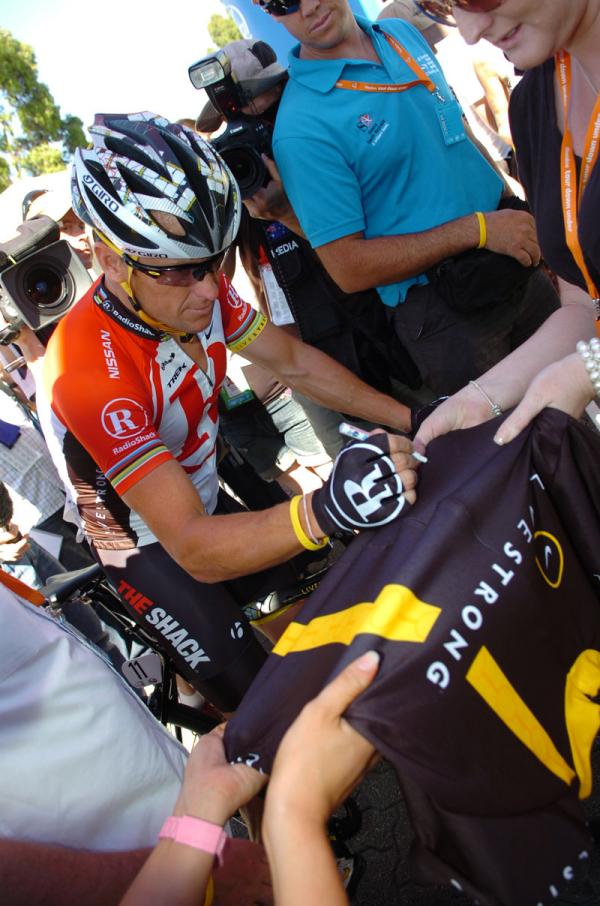Experts call Armstrong-HemAssist connection unlikely
Blood substitute ineffective, says new report

Following on the heels of the Sports Illustrated exposé which reported that US federal investigators had assembled evidence that Lance Armstrong had access to a blood substitute in clinical trials, a new report by the Associated Press claims the product, HemAssist, would have been ineffective as a performance enhancing drug.
SI reporters delved through hundreds of documents in an attempt to uncover the details of the investigation's evidence in the case, which is reportedly looking into claims made by Floyd Landis that there was organized doping within Armstrong's US Postal team during the 2002-2004 seasons.
The report states that the investigators have information that Armstrong gained access to HemAssist in the late 1990s. The drug, a "Diaspirin Cross-Linked Hemoglobin (DCLHb), was developed as an emergency blood substitute for trauma cases, and could, in theory, boost the blood's oxygen-carrying capabilities and provide a performance-enhancing benefit for aerobic sports.
While the SI report never alleges Armstrong actually used the drug, it quoted former Baxter researcher Robert Przybelski as saying a drug like HemAssist would be an ideal product to replace EPO - one that could have the same effect without the negative side-effects of blood thickening and strokes. He added that there may have been supplies of the drug remaining after the trial ended, but he was not aware of any missing quantities.
Speaking to the Associated Press today, Przybelski clarified that he didn't believe athletes ever used HemAssist.
"I could not imagine a cyclist using HemAssist or any HBOC day after day ... I would imagine that such a product would be used selectively for a most difficult mountain stage," he told AP. "But of course," he added, "I don't believe these products were ever used."
Armstrong's spokesman, Mark Fabiani, told Cyclingnews that because the product was in clinical trials and kept secure, and was discontinued by Baxter Healthcare, Inc, in late 1998 while still under trial, it was "impossible for Lance Armstrong to have obtained HemAssist during the period alleged by SI".
Get The Leadout Newsletter
The latest race content, interviews, features, reviews and expert buying guides, direct to your inbox!
The AP story also cites several experts who agree that HemAssist was unlikely to have been responsible for Armstrong's winning performances.
Yorck Olaf Schumacher, a researcher at the Freiburg University in Germany who was part of the study of a drug similar to HemAssist called Hemopure, said that hemoglobin-based oxygen carriers (HBOCs) showed no performance benefit. "There's nothing up to now that shows or proves that it improves performance," he told AP.
Michel Audran, a researcher at the University of Montpellier and one of the developers of the test to detect EPO, also participated in the Hemopure study and said that while it was "better than HemAssist and it didn't improve performance, so it would surprise me that he (Armstrong) took this for nothing."
Audran said that the experience of Spanish rider Jesus Manzano, who claims he was injected with an HBOC and then collapsed at the 2003 Tour de France, ended any experimentation with the drug in the professional peloton.
The World Anti-Doping Agency implemented a test for HBOCs in 2004, and there have never been any athletes who have been declared positive for its use.
The HemAssist allegation was only part of a 10-page report which collects a long list of anecdotes linking Armstrong to doping, all of which Fabiani called "the same tired old lies from the same old tired liars".

Laura Weislo has been with Cyclingnews since 2006 after making a switch from a career in science. As Managing Editor, she coordinates coverage for North American events and global news. As former elite-level road racer who dabbled in cyclo-cross and track, Laura has a passion for all three disciplines. When not working she likes to go camping and explore lesser traveled roads, paths and gravel tracks. Laura specialises in covering doping, anti-doping, UCI governance and performing data analysis.